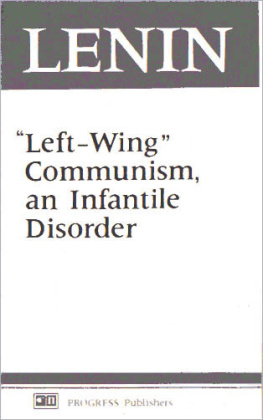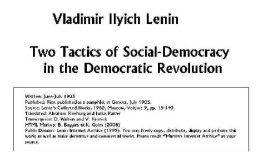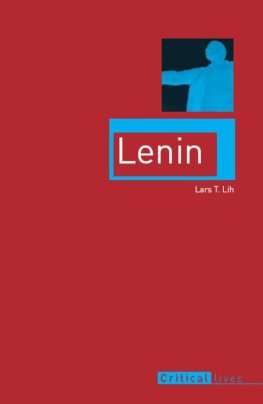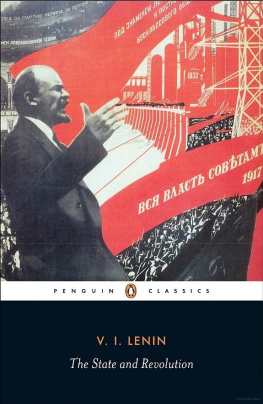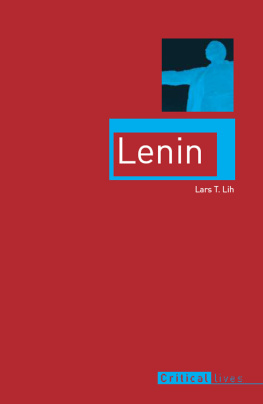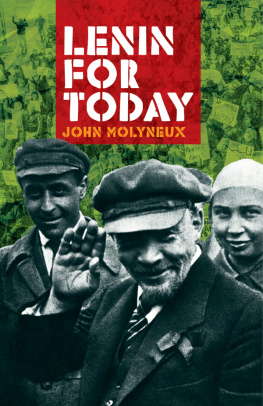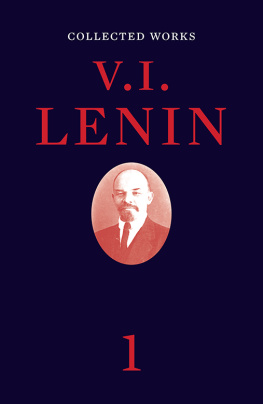Vladimir Ilyich Lenin - Left-Wing Communism: An Infantile Disorder
Here you can read online Vladimir Ilyich Lenin - Left-Wing Communism: An Infantile Disorder full text of the book (entire story) in english for free. Download pdf and epub, get meaning, cover and reviews about this ebook. year: 2014, publisher: Marxists Internet Archive, genre: Politics. Description of the work, (preface) as well as reviews are available. Best literature library LitArk.com created for fans of good reading and offers a wide selection of genres:
Romance novel
Science fiction
Adventure
Detective
Science
History
Home and family
Prose
Art
Politics
Computer
Non-fiction
Religion
Business
Children
Humor
Choose a favorite category and find really read worthwhile books. Enjoy immersion in the world of imagination, feel the emotions of the characters or learn something new for yourself, make an fascinating discovery.
- Book:Left-Wing Communism: An Infantile Disorder
- Author:
- Publisher:Marxists Internet Archive
- Genre:
- Year:2014
- Rating:4 / 5
- Favourites:Add to favourites
- Your mark:
- 80
- 1
- 2
- 3
- 4
- 5
Left-Wing Communism: An Infantile Disorder: summary, description and annotation
We offer to read an annotation, description, summary or preface (depends on what the author of the book "Left-Wing Communism: An Infantile Disorder" wrote himself). If you haven't found the necessary information about the book — write in the comments, we will try to find it.
Vladimir Ilyich Lenin: author's other books
Who wrote Left-Wing Communism: An Infantile Disorder? Find out the surname, the name of the author of the book and a list of all author's works by series.
Left-Wing Communism: An Infantile Disorder — read online for free the complete book (whole text) full work
Below is the text of the book, divided by pages. System saving the place of the last page read, allows you to conveniently read the book "Left-Wing Communism: An Infantile Disorder" online for free, without having to search again every time where you left off. Put a bookmark, and you can go to the page where you finished reading at any time.
Font size:
Interval:
Bookmark:
Left-Wing Communism: An Infantile Disorder
Vladimir Ilyich Lenin
Written: AprilMay 1920
Source:Collected Works, Volume 31, p. 17118
Publisher: Progress Publishers , USSR, 1964
First Published: As pamphlet, June 1920
Translated: Julius Katzer
Transcribed: Zodiac
Transcription\Markup: Brian Baggins and David Walters
Public Domain: Lenin Internet Archive (marxists.org) 2005. You may freely copy, distribute, display and perform this work; as well as make derivative and commercial works. Please credit Marxists Internet Archive as your source.
HTML Version: http://marxists.org/archive/lenin/works/1920/lwc/index.htm
Converted to eBook format by: Sajjan Singh (2014)
Contents
With this now-classic work, Lenin aimed to encapsulate the lessons the Bolshevik Party had learned from its involvement in three revolutions in 12 yearsin a manner that European Communists could relate to, for it was to them he was speaking. He also further develops the theory of what the "dictatorship of the proletariat" means and stresses that the primary danger for the working-class movement in general is opportunism on the one hand, and anti-Marxist ultra-leftism on the other.
"Left-Wing" Communism: an Infantile Disorder was written in April, and the appendix was written on May 12, 1920. It came out on June 8-10 in Russian and in July was published in German, English and French. Lenin gave personal attention to the books type-setting and printing schedule so that it would be published before the opening of the Second Congress of the Communist International, each delegate receiving a copy. Between July and November 1920, the book was re-published in Leipzig, Paris and London, in the German, French and English languages respectively.
"Left-Wing" Communism: an Infantile Disorder is published according to the first edition print, the proofs of which were read by Lenin himself.
In the first months after the proletariat in Russia had won political power (October 25 [November 7], 1917), it might have seemed that the enormous difference between backward Russia and the advanced countries of Western Europe would lead to the proletarian revolution in the latter countries bearing very little resemblance to ours. We now possess quite considerable international experience, which shows very definitely that certain fundamental features of our revolution have a significance that is not local, or peculiarly national, or Russian alone, but international. I am not speaking here of international significance in the broad sense of the term: not merely several but all the primary features of our revolution, and many of its secondary features, are of international significance in the meaning of its effect: on all countries. I am speaking of it in the narrowest sense of the word, taking international significance to mean the international validity or the historical inevitability of a repetition, on an international scale, of what has taken place in our country. It must be admitted that certain fundamental features of our revolution do possess that significance.
It would, of course, be grossly erroneous to exaggerate this truth and to extend it beyond certain fundamental features of our revolution. It would also be erroneous to lose sight of the fact that, soon after the victory of the proletarian revolution in at least one of the advanced countries, a sharp change will probably come about: Russia will cease to be the model and will once again become a backward country (in the "Soviet" and the socialist sense).
At the present moment in history, however, it is the Russian model that reveals to all countries somethingand something highly significantof their near and inevitable future. Advanced workers in all lands have long realised this; more often than not, they have grasped it with their revolutionary class instinct rather than realised it. Herein lies the international "significance" (in the narrow sense of the word) of Soviet power, and of the fundamentals of Bolshevik theory and tactics. The "revolutionary" leaders of the Second International, such as Kautsky in Germany and Otto Bauer and Friedrich Adler in Austria, have failed to understand this, which is why they have proved to be reactionaries and advocates of the worst kind of opportunism and social treachery. Incidentally, the anonymous pamphlet entitled The World Revolution (Weltrevolution), which appeared in Vienna in 1919 (Sozialistische Bucherei, Heft 11; Ignaz Brand), very clearly reveals their entire thinking and their entire range of ideas, or, rather, the full extent of their stupidity, pedantry, baseness and betrayal of working-class interestsand that, moreover, under the guise of "defending" the idea of "world revolution".
We shall, however, deal with this pamphlet in greater detail some other time. We shall here note only one more point: in bygone days, when he was still a Marxist and not a renegade, Kautsky, dealing with the question as an historian, foresaw the possibility of a situation arising in which the revolutionary spirit of the Russian proletariat would provide a model to Western Europe. This was in 1902, when Kautsky wrote an article for the revolutionary Iskra, entitled "The Slavs and Revolution". Here is what he wrote in the article:
"At the present time [in contrast with 1848] it would seem that not only have the Slavs entered the ranks of the revolutionary nations, but that the centre of revolutionary thought and revolutionary action is shifting more and more to the Slavs. The revolutionary centre is shifting from the West to the East. In the first half of the nineteenth century it was located in France, at times in England. In 1848 Germany too joined the ranks of the revolutionary nations.... The new century has begun with events which suggest the idea that we are approaching a further shift of the revolutionary centre, namely, to Russia.... Russia, which has borrowed so much revolutionary initiative from the West, is now perhaps herself ready to serve the West as a source of revolutionary energy. The Russian revolutionary movement that is now flaring up will perhaps prove to be the most potent means of exorcising the spirit of flabby philistinism and coldly calculating politics that is beginning to spread in our midst, and it may cause the fighting spirit and the passionate devotion to our great ideals to flare up again. To Western Europe, Russia has long ceased to be a bulwark of reaction and absolutism. I think the reverse is true today. Western Europe is becoming Russias bulwark of reaction and absolutism.... The Russian revolutionaries might perhaps have coped with the tsar long ago had they not been compelled at the same time to fight his allyEuropean capital. Let us hope that this time they will succeed in coping with both enemies, and that the new Holy Alliance will collapse more rapidly than its predecessors did. However the present struggle in Russia may end, the blood and suffering of the martyrs whom, unfortunately, it will produce in too great numbers, will not have been in vain. They will nourish the shoots of social revolution throughout the civilised world and make them grow more luxuriantly and rapidly. In 1848 the Slavs were a killing frost which blighted the flowers of the peoples spring. Perhaps they are now destined to be the storm that will break the ice of reaction and irresistibly bring with h a new and happy spring for the nations" (Karl Kautsky, "The Slavs and Revolution", Iskra, Russian Social-Democratic revolutionary newspaper, No. 18, March 10, 1902).
How well Karl Kautsky wrote eighteen years ago!
Next pageFont size:
Interval:
Bookmark:
Similar books «Left-Wing Communism: An Infantile Disorder»
Look at similar books to Left-Wing Communism: An Infantile Disorder. We have selected literature similar in name and meaning in the hope of providing readers with more options to find new, interesting, not yet read works.
Discussion, reviews of the book Left-Wing Communism: An Infantile Disorder and just readers' own opinions. Leave your comments, write what you think about the work, its meaning or the main characters. Specify what exactly you liked and what you didn't like, and why you think so.

